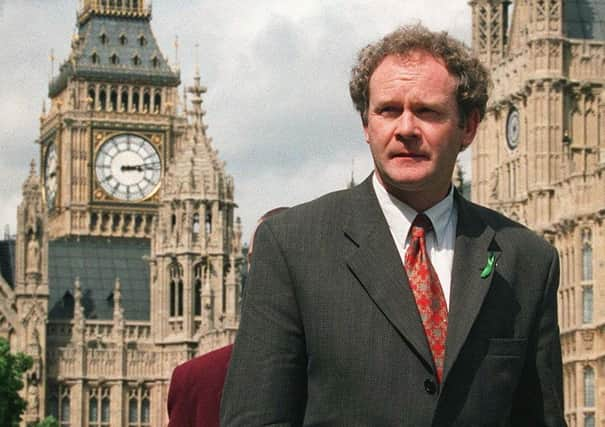Declassified files: Dublin found Martin McGuinness easier to deal with but more hardline on consent than Gerry Adams


An account of a dinner enjoyed by Paddy Teahon, secretary general to John Bruton, and John Major’s private secretary John Holmes on March 4 gives an insight into their thinking.
Mr. Holmes wrote: “Teahon repeated familiar points about the South’s lack of interest in taking over the North (not recognised by Unionists); the possibility of change to Articles 2 and 3 of the Constitution as part of a package; the availability of a settlement on Framework Document lines and Adams’ readiness to accept this (although only ‘in this phase’); the desirability of a ‘Sunningdale’ approach at some stage (i.e. lock all the party leaders up together with a time limit); the relative ease of doing business with McGuinness rather than Adams - a slippery customer; the problem of Hume’s lack of engagement in the talks; the Unionists’ lack of confidence in their ability to negotiate.”
Advertisement
Hide AdAdvertisement
Hide AdAt the time Sinn Féin were pressing for inclusion in peace talks but this was being resisted by the British. Mr. Holmes stated: “‘Teahon’ believed that, while there would always be an IRA hard core unwilling to give up violence, and while there was absolutely no reason to believe Adams and McGuinness wanted to abandon the option of violence, the only hope of moving them away from it was to encourage them into the political process.”
An account of a dinner between British Ambassador Veronica Sutherland and Bertie Ahern, showed McGuinness was viewed as more intransigent on republican principles. In a restricted memo Ms. Sutherland said she had a discussion with the Fianna Fáil leader over a ‘lunch à deux.’
“In Ahern’s view, all his interlocutors in the North wanted a settlement. He was convinced that both Adams and [Mitchel] McLaughlin personally accepted the consent principle and were trying to persuade others to follow them, although Martin McGuinness represented an obstacle in this respect.”